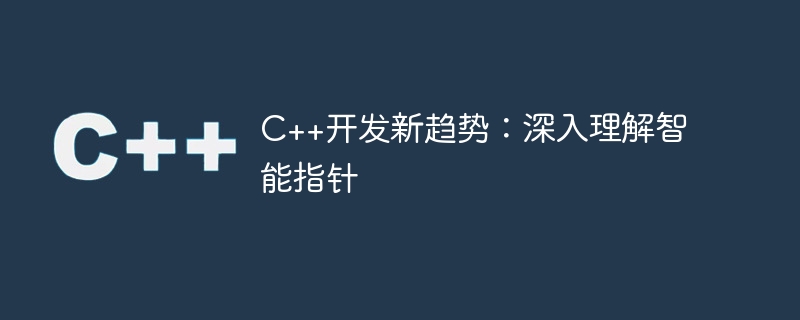

With the continuous advancement of technology and the rapid development of the software industry, C, as a powerful and flexible programming language, has been leading the trend of software development. In recent years, a new trend has emerged in the field of C development, namely the in-depth understanding and application of smart pointers. This article will introduce the concept, function, advantages and usage precautions of smart pointers to help readers better understand and use smart pointers.
First, let’s understand the concept of smart pointers. In traditional C development, programmers need to manually manage the allocation and release of memory resources. This can lead to some common programming errors such as memory leaks and dangling pointers. Smart pointers are a special pointer type that can automatically manage the allocation and release of memory resources, reducing the burden on programmers and improving the reliability and maintainability of the code.
Smart pointers have a wide range of functions. First, it can effectively prevent memory leaks. By encapsulating resource allocation and release in smart pointer objects, the correct release of resources can be ensured even in complex control flows. Secondly, smart pointers can also prevent the occurrence of dangling pointers. Once the resource is no longer used, the smart pointer will automatically set the pointer to null, avoiding problems caused by dangling pointers. In addition, smart pointers also facilitate multi-threaded programming because they use a reference counting mechanism internally to safely share resources in a multi-threaded environment.
Smart pointers have many advantages over traditional pointers. First, they provide safer memory management. Since smart pointers automatically call the destructor to release resources, there is no need to manually manage the allocation and release of memory resources, greatly reducing the chance of errors. Secondly, smart pointers can reduce code redundancy. In traditional C development, a large amount of code needs to be written to allocate and release memory resources, but smart pointers can simplify the code structure by automatically performing these operations. Additionally, smart pointers can improve code readability and maintainability because they clearly express resource ownership and lifecycle.
Of course, there are some things that need to be paid attention to when using smart pointers. First, we need to choose the appropriate smart pointer type. In the C standard library, there are several smart pointer types to choose from, such as unique_ptr, shared_ptr, weak_ptr, etc. We need to choose the appropriate type according to the specific scenario. Secondly, we need to avoid circular reference problems. Since shared_ptr uses a reference counting mechanism to manage resources, if a circular reference occurs, it may cause resource leakage. Therefore, it is necessary to design the relationship between objects reasonably to avoid the occurrence of circular references.
In short, in-depth understanding and application of smart pointers is a new trend in C development. Smart pointers can effectively solve a series of problems caused by traditional pointers and improve the reliability and maintainability of code. At the same time, it is also very important to use smart pointers correctly. You need to choose the appropriate type and avoid circular reference problems. I believe that through in-depth understanding and application of smart pointers, we can achieve better results in C development.
The above is the detailed content of New Trend in C++ Development: In-depth Understanding of Smart Pointers. For more information, please follow other related articles on the PHP Chinese website!




